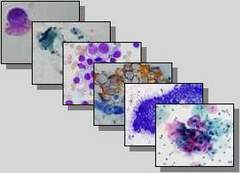
Clinical Cytology in Croatia Today
|
|
Clinical Cytology in Croatia Today |
In 21 town throughout Croatia there are 49 organisational units that are performing
cytological diagnostics tasks within general and clinical hospitals, clinical centres,
public health centres and private cytological clinics. A devastating fact is that the
Department of Clinical Cytology does not exist in 5 general and 2 clinical hospitals,
whereas it is illogical that cytological diagnostics is performed at more posts within a
hospital (up to 5). Within public health centres, cytology is organised only sporadically
(in 4 out of 120). Organizationally, in 42% a
cytological unit is either laboratory or section within a clinical department, the most
often within an internal or gynecological one. Such
an organization is more frequent in clinical hospitals and clinical centres. At 29%, a cytology unit is within the pathology
department, mostly in general hospitals, while at 29%, a cytological unit is an independent diagnostic department.
There are 64 specialists (7 doctors and 17 masters of science) working in the
mentioned units, plus 22 residents of clinical cytology, 75 cytotechnicians and
41 laboratory technicians. The ratio cytologist :
cytotechnician is 1:1,2 which is far from covering the needs, and is greatly a consequence
of interruptions in the organised training of cytotechnicians. However, apart from them, on certain posts there are employees with the university, post high-school or high school degrees, but of another (even non-health related) profile whose qualifications do not meet the criteria needed for practising cytological diagnostics.
According to the type of the analysed material, 63% of units perform complete cytology, 16% perform complete cytology with the exception of gynecological, while 21% deals only with one branch of cytology.
According to the types of cytological examinations, three quarters of laboratories are performing only cytological and cytochemical analyses, whilst the sophisticated and expensive ones are performed only in one fourth of the laboratories.
The number of employees per diagnostic unit varies between
1 and 16. 50% are small-staff teams with 1 to 4 employees, 26% have 5-8 employees, and only 24% have 9 to 16 employees.
According to the number of employees, the largest organisational cytological units in Croatia are:
The largest number of units function in relatively modest space conditions, with only the most fundamental standard equipment, whilst only the largest ones have adequate space on their disposal
and the equipment for the most complex cytological examinations, and for the scientific and educational activity.
Non-existence of legally prescribed organisational scheme for cytodiagnostics service is
the reason for such confusion and motley in that area. For various reasons and following
the principle that "everything that is not prohibited is permitted", anyone who
wishes to practise cytology does so, even without prescribed and sufficient education,
regardless to their basic specialities and within largely different departments.
Therefore, nowadays, apart from the specialist cytologists, cytological preparations are
analysed and signed by gynecologists, pathologists, general practitioners, biologists and
others, with or without post-graduate studies in medical cytology.
The Croatian Society for Clinical Cytology, as the most highly respected professional body
for the area of cytological diagnostics, considers that the post-graduate study in medical
cytology itself is not sufficient education for the independent work and performance of
cytodiagnostical tasks. Therefore, cytology is to be practised only by specialists -
cytologists within independent organisational units. The health system reform that is
to be conducted in the near future is an excellent opportunity to, within the
categorization of health system institutions, supply guidelines for the uniform and
efficient organisation of cytological service, which is the only proper solution and which
would clearly define:
- which health system institution has to contain a Department of Clinical Cytology - minimum space, equipment and personnel standards - types and scope of cytological examinations that would be performed in certain institutions
(Marija Pajtler, Clinical Cytology in Croatia Today - the results of the survey carried out at the beginning of 2000. It was presented on the Second Croatian Congress of Clinical Cytology with international participation, Zagreb, June 2000) |